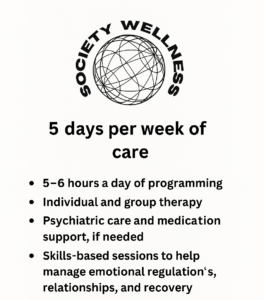You don’t have to be in crisis to feel lost.
Maybe you’ve tried therapy before, and it didn’t stick. Maybe you’ve kept your struggles quiet—out of fear, habit, or exhaustion. Or maybe you’re just now letting yourself consider that your mental health or substance use might need something more.
If you’re LGBTQ+, that decision often carries another layer: Will I feel safe here? Will I be understood without having to explain my whole self?
At Society Wellness in Boston, we hear these questions often. And we’ve built our LGBTQ partial hospitalization program (PHP) to be a space that answers them with care—not just information.
Below, we’ve gathered the most common (and often unspoken) questions we hear from people in Massachusetts who are considering PHP. If you’re not sure if this is for you, that’s okay. Just reading this is a form of courage.
1. What is a partial hospitalization program, exactly?
A partial hospitalization program (PHP) is a form of structured treatment that offers intensive daily support—but still allows you to go home at night.
It’s not inpatient, and it’s not a once-a-week therapy session either. It’s something in between, offering:
- 5 days per week of care
- 5–6 hours a day of programming
- Individual and group therapy
- Psychiatric care and medication support, if needed
- Skills-based sessions to help manage emotional regulation, relationships, and recovery
People often come to PHP when therapy alone isn’t enough—but full-time hospitalization feels like too much. It’s ideal for that middle ground: when you’re still functioning, but struggling more than you’re letting on.

2. What makes Society Wellness’s PHP different from a regular one?
In short: it’s built specifically for LGBTQ+ people.
At Society Wellness, we don’t just include you—we center you. Our clinicians are not only licensed therapists and psychiatric providers, but also trained in:
- LGBTQ+ cultural and clinical competency
- Trauma-informed care specific to identity-based stress
- Affirming language, pronoun use, and gender diversity
- Family-of-origin issues common in queer/trans communities
- Intersectional approaches to race, class, disability, and queerness
This isn’t just a place where you’ll be “tolerated.” It’s a place where your identity belongs in the healing process.
3. What happens during a typical day?
Each day in PHP is a little different—but here’s a sample flow you might expect:
- Morning check-in: A grounding space to set goals and share how you’re arriving today.
- Core therapy groups: Focused on topics like trauma resilience, relapse prevention, emotional regulation, and internalized stigma.
- Skill-building workshops: Learn practical tools for navigating relationships, stress, identity struggles, and daily functioning.
- Individual therapy sessions: Meet weekly with your personal clinician to go deeper into your story and treatment goals.
- Optional psychiatric consults: Medication management or diagnostic clarification, if part of your care plan.
We also build in breaks, movement, and gentle rituals to keep the day humane—not overwhelming.
4. What if I’m not in crisis? Do I “qualify” for PHP?
This is one of the most common questions—and one of the most misunderstood.
You do not have to be in crisis to participate in PHP. In fact, many of our clients are:
- Holding down jobs or school
- Managing sobriety or trying to cut back
- Dealing with “low-level” depression, anxiety, or burnout that isn’t improving
- High-functioning on the outside, but deeply overwhelmed on the inside
You qualify if you need more than what once-a-week therapy can offer—and if you’re ready to be supported on a daily level. That’s enough. You’re enough.
5. What if I’ve tried treatment before and it didn’t work?
Then you’re exactly who this program is for.
We’ve built our PHP to serve people who’ve been let down by treatment in the past. That includes:
- People who were misgendered, minimized, or retraumatized in care
- People who were told they “weren’t trying hard enough”
- People who bounced from provider to provider, trying to feel seen
If you’re quietly struggling with the question, “What if nothing works for me?”—you’re not alone. That’s often the place real healing begins. Because this time, you don’t have to carry it alone—or explain why the last attempt wasn’t the right fit.
Additional FAQs: Quick Answers, Honest Clarity
How long does PHP usually last?
Most people attend PHP for 2 to 6 weeks, depending on their needs. Your length of stay is personalized and reassessed weekly with your clinician.
Will I be around other LGBTQ+ people?
Yes. Our program is specifically LGBTQ-focused, and your peer group will include others navigating similar identity intersections and healing paths.
Can I still live at home while attending?
Yes. PHP is a day program. You return home (or to a sober or supportive space) in the evening.
Do I have to talk in group sessions?
You’ll never be forced to speak—but you’ll be invited to, gently. Many people are surprised at how quickly they feel safe enough to participate, especially when they’re finally in a room where they don’t have to code-switch.
Is this program covered by insurance?
Most major insurance plans cover PHP, and our admissions team will help verify your benefits. We also offer support for self-pay and financial planning options.
What if I don’t know how to talk about what’s wrong?
That’s okay. You don’t need perfect language to begin. Many clients start by saying “I’m not sure why I’m here, but I know I need help.” That’s enough.
You’re Allowed to Want More—And We’re Here When You’re Ready
If you’ve been quietly wondering if care could feel different—if it could finally feel right—this is your sign that yes, it can.
At Society Wellness, our LGBTQ partial hospitalization program in Boston is here for those in between places. Not inpatient. Not doing fine. Still struggling—but still hoping.
Call at(888) 964-8116 or Contact Us.

